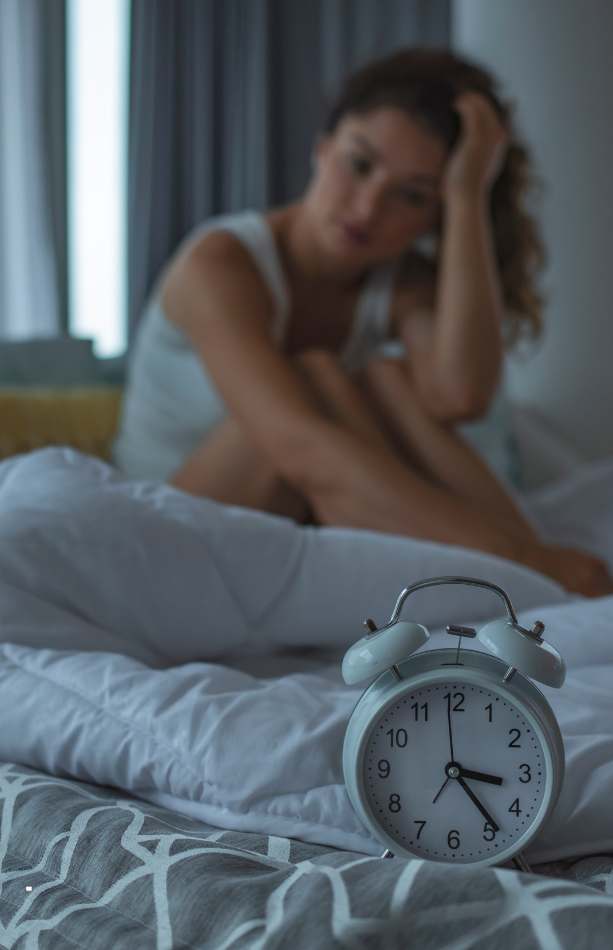Sleep Issues
Sleep Issues and Hormonal Imbalance
Sleep disturbances are a common and frustrating symptom experienced during perimenopause, menopause, and while adjusting to hormone replacement therapy (HRT). These sleep issues can leave you feeling exhausted, irritable, and unable to focus during the day. The impact of poor sleep goes beyond just fatigue—it affects your physical, emotional, and mental well-being. Understanding how hormonal imbalances contribute to sleep problems is the first step toward finding effective solutions to improve your quality of sleep.
The Hormonal Connection to Sleep Issues
Your sleep patterns are heavily influenced by hormones, and fluctuations during perimenopause, menopause, and HRT transitions can disrupt your natural sleep cycle. Here’s how the major hormones contribute to sleep problems:
- Estrogen – Estrogen is essential for regulating sleep patterns, particularly in the regulation of serotonin, which affects mood and sleep. Low levels of estrogen can result in difficulty falling asleep, staying asleep, or experiencing restful sleep.
- Progesterone – Progesterone has a calming effect on the body, helping to induce sleep. During menopause, as progesterone levels drop, many individuals experience difficulty falling asleep or staying asleep.
- Cortisol – Progesterone has a calming effect on the body, helping to induce sleep. During menopause, as progesterone levels drop, many individuals experience difficulty falling asleep or staying asleep.
- Melatonin – Melatonin, the hormone that regulates your sleep-wake cycle, can also be affected by hormonal changes. Reduced melatonin production during perimenopause and menopause may contribute to insomnia and other sleep disturbances.
- Testosterone – Testosterone plays a role in regulating the sleep cycle. Low levels of testosterone may contribute to feelings of restlessness or reduced sleep quality.
Types of Sleep Issues During Hormonal Changes
Hormonal shifts during perimenopause, menopause, and while transitioning with HRT can lead to various sleep issues. Here are some common types of sleep disturbances individuals may experience:
- Insomnia – Difficulty falling asleep or staying asleep, often resulting in waking up multiple times during the night and not feeling rested upon waking.
- Waking Up Too Early – Waking up before your alarm, often in the middle of the night or very early in the morning, and being unable to return to sleep.
- Night Sweats and Hot Flashes – The discomfort caused by hot flashes and night sweats can significantly disrupt sleep, leading to waking up feeling overheated or drenched in sweat.
- Restless Sleep – TTossing and turning throughout the night or experiencing interrupted sleep due to vivid dreams, body discomfort, or anxiety.
- Sleep Apnea – Some individuals may experience breathing disruptions during sleep, especially if weight gain or other factors are contributing to airway obstruction.

Tips for Managing Sleep Issues
At New Insights Health & Wellness, we offer a holistic approach to managing sleep issues associated with hormonal changes. With the right combination of lifestyle adjustments, stress management, and medical support, you can regain control over your sleep and improve overall well-being.
✅ Hormone Therapy (HRT)
One of the most effective ways to manage sleep disturbances caused by hormonal imbalances is hormone replacement therapy. By restoring estrogen, progesterone, and testosterone levels to their natural balance, HRT can help regulate sleep patterns and improve the quality of your rest.
✅ Cognitive Behavioral Therapy for Insomnia (CBT-I)
CBT-I is a structured, evidence-based approach that helps you identify and change thoughts and behaviors contributing to poor sleep. It’s one of the most effective therapies for insomnia and can help improve both the quantity and quality of sleep.
✅ Exercise and Physical Activity
Engaging in regular physical activity can help regulate your body’s sleep-wake cycle. Just make sure to avoid intense exercise too close to bedtime, as it may interfere with your ability to fall asleep. Moderate exercises like walking or gentle yoga are ideal for improving sleep quality.
✅ Relaxation Techniques
Relaxation techniques can help calm the mind and prepare the body for restful sleep. These include:
- Progressive Muscle Relaxation: A technique where you tense and then relax different muscle groups in the body, helping to release physical tension.
- Mindfulness Meditation: Guided meditation that focuses on deep breathing and grounding exercises to promote relaxation and reduce anxiety before bedtime.
- Breathing Exercises: Deep-breathing exercises, such as the 4-7-8 technique, can help lower cortisol levels and promote a state of relaxation conducive to sleep.
✅ Improve Sleep Hygiene
Creating a sleep-friendly environment and routine can significantly improve your ability to fall and stay asleep:
- Create a Dark, Quiet Environment: Use blackout curtains to eliminate light and consider earplugs or a white noise machine to block out disruptive sounds.
- Consistent Sleep Schedule: Go to bed and wake up at the same time every day, even on weekends, to regulate your circadian rhythm.
- Limit Screen Time: Reduce exposure to screens (phones, tablets, computers) at least an hour before bed, as blue light can interfere with melatonin production.
- Avoid Stimulants: Limit caffeine and alcohol, especially in the evening, as they can disrupt your sleep cycle.
✅ Dietary Considerations
What you eat can also impact your sleep. Avoid large, heavy meals close to bedtime, as they can cause indigestion and disrupt sleep. Certain foods, like those rich in magnesium (e.g., leafy greens, almonds), can promote relaxation and better sleep. Herbal teas like chamomile or valerian root are known for their calming properties and can be a soothing bedtime ritual.
Emotional Impact of Sleep Issues
Chronic sleep deprivation can lead to irritability, anxiety, depression, and cognitive impairment. The emotional toll of poor sleep is significant, as it can affect mood, relationships, and overall quality of life. Addressing sleep disturbances with a combination of medical care, self-care, and emotional support can help mitigate these impacts and restore a sense of balance.
